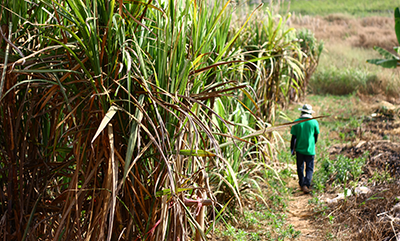Continuing Search for Causes of Kidney Disease in Central America.
 The School of Public Health Research Group for the Study of Chronic Kidney Disease (CKD) is initiating a new research program investigating the epidemic of CKD among workers in Central America.
The School of Public Health Research Group for the Study of Chronic Kidney Disease (CKD) is initiating a new research program investigating the epidemic of CKD among workers in Central America.
The work will be supported by a new, $3.5 million grant from the National Institute of Environmental Health Sciences (NIEHS) and a new $900,000 gift from the Azucareros del Istmo Centroamericano (AICA), an association of sugar producers in Central America.
The NIEHS grant will fund research on the as-yet unexplained epidemic of CKD among workers in El Salvador. AICA has donated funds to establish the Central American CKD Fund at SPH. According to Juan Carlos Fernandez, executive director of AICA, AICA members are hopeful that the BU team’s NIH-funded work in El Salvador will yield answers to the epidemic.
“CKD is a serious problem affecting our region, including workers in our industry, and additional research on this epidemic is essential. Our contribution to this effort is consistent with our long-standing commitment to social responsibility,” Fernandez said.
The new funding builds on a March 2017 award to Madeleine Scammell, assistant professor of environmental health, who was one of five researchers selected for an Outstanding New Environmental Scientist (ONES) award.
The unrestricted funds from AICA will provide Scammell, along with researchers Michael McClean, associate dean for research and faculty advancement and professor of environmental health, and Daniel Brooks, associate professor of epidemiology, with the support necessary to expand on the ONES award, the research team said. As specified in the gift agreement, the donors will have no influence on the design of the study, execution of the research, or publication of the findings.
The combination of funding provides the research group with a unique opportunity, according to McClean.
“Our goal is to identify the specific factors responsible for the epidemic, so that we can develop the best possible intervention strategy and prevent future disease,” he said. “The funds from AICA will allow us to expand this effort to include workers from a larger number of agricultural and non-agricultural industries in both El Salvador and Nicaragua.”
Brooks agreed that this type of approach is “crucial,” given that this epidemic has resulted in an ongoing public health emergency in the affected countries.
The CKD epidemic in Central America, also called Mesoamerican Nephropathy (MeN), disproportionately affects younger men, particularly agricultural and other workers engaged in manual labor, and appears to be unrelated to traditional kidney disease risk factors, such as diabetes. Mortality from the disease has increased significantly over the past 20 years, but the specific cause or causes remain unknown. Investigators from SPH have been involved in researching the CKD epidemic since 2008, and their collaborators in the region have been engaged in the work for decades.
Additional researchers on the occupational study team include: Jessica Leibler, assistant professor of environmental health; Yorghos Tripodis, associate professor of biostatistics; and Caryn Sennett, research assistant in environmental health.
—Lisa Chedekel
To learn more about the group’s research on the CKD epidemic in Central America, please visit their website.